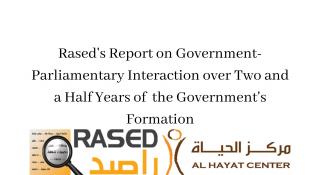“Jordan Integrity and Anti-Corruption Commission” Announces the Results of the National Integrity Index
The Jordanian Integrity and Anti-Corruption Commission (JIACC) announced the results of the National Integrity Index (NII) in a ceremony held this evening, which resulted in the awarding of five categories in which 100 entities competed, including ministries, public institutions, municipalities, universities, and hospitals.
The Chairman of JIACC, Dr. Muhannad Hijazi, said that announcing the results of the first phase of the National Integrity Index, which was launched in 2022 in cooperation with the Al-Hayat Center - RASED, reflects an important stage in the field of evaluating the achievements and appreciating the efforts made by the institutions participating in the index to implement standards. The index is about institutional performance in all aspects, which is directly reflected in the efficiency and effectiveness of operations and the quality of services provided to the public.
He added during his speech at the ceremony held at the Landmark Hotel in Amman, that we in the Integrity and Anti-Corruption Commission consider that these results, with their digital and moral dimensions, establish a promising future stage for adopting the National Integrity Index standards as a system for institutional development and modernization and a tool for evaluation and self-development. Dr. Hijazi expressed his hope that the public administration institutions participating in this phase and those that will participate in future phases will take the lessons learned and act accordingly to improve the level of institutional, functional, and financial management performance.
Hijazi also expressed his appreciation to the Commission's strategic partners, the European Union, and the Spanish government for the continuous support they provide to the Integrity and Anti-Corruption Commission.
Dr. Amer Bani Amer, General Director of Al-Hayat Center - RASED, said that today we are living in a phase of comprehensive modernization, where integrity standards must be the basis for modernization, whether political or economic, and that any legislation must embed integrity standards.
Dr. Bani Amer stressed the importance of implementing this national project represented by the National Integrity Index, which will have a reflection on the trust in public institutions at all levels, noting that this day represents the start of a legitimate and transparent process of implementing national integrity standards on the level of official and civil society institutions to ensure that they comply with these standards.
The Ambassador of the Kingdom of Spain to Jordan, Miguel de Lucas, emphasized the good political relations between Jordan and Spain, and expressed his gratitude to the Jordanian Integrity and Anti-Corruption Commission and the partners working on this project. De Lucas pointed to the importance of active citizenship to build a prosperous and socially cohesive society. De Lucas then praised the process of reforms at the political, economic and administrative levels in Jordan, and stressed the importance of the NAZAHA project implemented in cooperation with the European Union and the Spanish Agency for International Cooperation (AECID) and Al-Hayat Center - RASED and Rasheed - Transparency International, which aims to enhancing integrity and accountability in the public sector in Jordan, and contributing to improving the performance of the public sector and its response to the needs of citizens.
In the context of the partnership between the European Union and Jordan, Ambassador of the European Union to Jordan, H.E Maria Hadjitheodosiou, said that it is based on common values and dialogue, democratic governance and the systems of a responsive state, accountable institutions and the fight against corruption are important elements of our cooperation.
At this time, as Jordan moves forward with its ambitious plans for public administration reform, as well as political and economic modernisation, led by HM King Abdullah II, trust-in and credibility-of public institutions are even more important. Because it is accountability and transparency that can make a good organisation great; it would be accountability and transparency that can really make the difference in transforming Jordan into a regional role model. "We are very proud to be in position to accompany Jordan in this trajectory."
At the end of the ceremony, the Chairman of the Integrity and Anti-Corruption Commission, Dr. Muhannad Hijazi handed over the Integrity Shield at the national level for the year 2022 to the representative of the Ministry of Planning and International Cooperation for obtaining the highest score in assessing the extent of compliance and commitment to applying national integrity standards. It also won the National Integrity Index Award for the Ministries category, and the Government Bidding Department won the Integrity Index Award. The National Integrity Index award for the public departments and institutions category, while the Zarqa Municipality won the National Integrity Index award for the municipalities category, and the Jordan University of Science and Technology won the National Integrity Index award for the public universities category, while the Founding King Abdullah University Hospital won the National Integrity Index award for the government hospitals category.
It is worth mentioning that the National Integrity Index was launched by the Integrity and Anti-Corruption Commission in cooperation with the Al-Hayat Center - RASED in August of last year, in line with the directives of His Majesty King Abdullah II Ibn Al-Hussein, on the need to participate and intensify national efforts for the process of modernization and reform and in order to enter the second centenary of The life of the state with great confidence and determination and better competitive performance, and it has been implemented with purely national capabilities and with the minds and arms of the people of the Authority and under the direct supervision of the management of the Supreme Authority, through which it aimed to push public administration institutions to engage in real and concrete actions to combat and prevent corruption through their application of integrity standards This will contribute to the institutionalization of the conceptual and application framework of these standards and thus activate the values and behavioral rules and improve the quality of services of these institutions, which enhances confidence in their performance.


